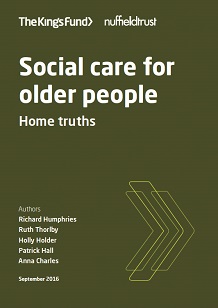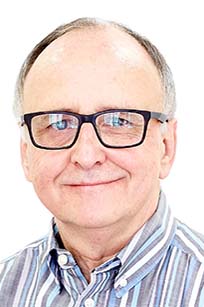News / News review - October 2016
Junior doctors, accounting practices and social care were in the spotlight in September.
Even in a month that saw the publication of two-year planning guidance and draft tariffs, questions over NHS financial and operational sustainability and confirmation of a new oversight framework, junior doctors managed to grab the spotlight.
Having announced in August a series of five-day strikes over several months, the British Medical Association abandoned the first in September, before going on to suspend the remaining action due in October, November and December. The decisions were taken for reasons of patient safety, the BMA said, and there had been growing disquiet among the medical royal colleges, the General Medical Council and some juniors about the impact on patients.
So where are we now on the lengthy dispute? The BMA still opposes the new contract for junior doctors, though the government remains committed to introducing it from this month. The Department of Health won a judicial review of the contract, brought by the group Justice for Health, at the end of last month. The group had questioned the legality of the imposition of the contract; whether the health secretary had properly informed the public and Parliament; and the evidence behind the proposed changes.
Department of Health permanent secretary Chris Wormald defended the actions taken to balance the accounts in 2015/16. At a hearing of the Commons Public Accounts Committee on the Department accounts, he said they were within normal professional standards and had been signed off by the National Audit Office. He recognised many of the measures were one-off and unsustainable and this had prompted the financial reset over the summer. He was also pressed on the Department’s receipt of an additional £417m from the National Insurance Fund in 2015/16. Without the funding the Department would have exceeded its revenue budget voted by Parliament. Mr Wormald insisted it was due to a mistake and steps were being taken to ensure itwould not happen again. 
Nuffield Trust chief economist John Appleby said the NHS would still be affordable through general taxation by 2030. He was commenting on long-term projections from the Office for Budget Responsibility on how NHS spending could grow, based on population and other factors. Mr Appleby said the UK currently spends 7.4% of GDP (£140bn) on healthcare each year. The OBR projections show that by 2020 this will have fallen to 6.9%, but could rise to 8.8% (£234bn at today’s prices) by 2030. This was an average annual real terms increase of 3.5%, which was less than the historic UK average of 4%, he said.
The Nuffield Trust and the King’s Fund highlighted the projected funding gap in adult social care. They said it would rise to at least £2.8bn by 2019/20.
A joint report, Social care for older people: home truths, said public sector adult social care spending would shrink to less than 1% of GDP by the end of the decade and called for a new public debate on how to fund social care. Additional pressure on hospital beds have been in part attributed to recent cuts in adult social care spending.
Problems with patient discharge were highlighted further in a report by the Commons Public Administration and Constitutional Affairs Committee. It said pressure on resources and capacity in hospitals were leading to ‘worrying and unsafe discharge practices’. It called on health and social care leaders to ensure staff worked in an environment where patient-centred care was the undisputed priority. It considered the split between health and social care, which meant they were managed and funded separately, to be political maladministration.
 More information on health service organisations’ vulnerability to cyber attack emerged in September. The National Audit Office said there was a sharp spike in cyber attacks in the health sector in the second quarter of 2015/16. Previously health was not thought to be a high-threat sector, according to Protecting information across government. While health had consistently the highest number of data breaches, this may be due to the Department of Health’s insistence that all personal data breaches must be reported. This stance has not been adopted across all Whitehall departments, the NAO said. The report noted the efforts the sector has made to secure its data, including the establishment of the national CareCERT programme (Healthcare Finance September 2016, page 20). Wales health secretary Vaughan Gething announced an £11m investment in IT to improve cyber security in local health boards and trusts.
More information on health service organisations’ vulnerability to cyber attack emerged in September. The National Audit Office said there was a sharp spike in cyber attacks in the health sector in the second quarter of 2015/16. Previously health was not thought to be a high-threat sector, according to Protecting information across government. While health had consistently the highest number of data breaches, this may be due to the Department of Health’s insistence that all personal data breaches must be reported. This stance has not been adopted across all Whitehall departments, the NAO said. The report noted the efforts the sector has made to secure its data, including the establishment of the national CareCERT programme (Healthcare Finance September 2016, page 20). Wales health secretary Vaughan Gething announced an £11m investment in IT to improve cyber security in local health boards and trusts.
The government and NHS leaders must set out a credible plan for expanding the use of digital technology and quickly clarify when funding will become available, the King’s Fund said. Frontline staff backing for digital plans could be lost because of changing priorities, the introduction of new initiatives and slipping timescales. It also said holding back funding until later in the Parliament would slow progress. In the meantime, the Department of Health announced 12 NHS organisations would receive up to £10m to deliver pioneering digital services and help other health service organisations learn from their experiences. The ‘global exemplars’ include trusts in Salford, London, Bristol and Sunderland. The digital services will include new smartphone apps, instant access to personal health records, an online NHS 111 triage service and a relaunch of NHS Choices.
Health is a key element of the Welsh government plans for the next five years. Its new programme focuses on improving patient access, increasing clinical staff numbers and bolstering mental health and older people’s services. Announcing the government’s five-year plan, first minister Carwyn Jones committed to introducing a new treatment fund to provide quicker access to innovative treatments and also to prioritising mental healthcare support, prevention and de-escalation.
The Scottish government was also looking at access, but in the shorter term – announcing that health boards are to share £9m to help emergency departments, hospitals and primary and social care teams prepare for the coming winter. The Scottish government said the funding would support dedicated multidisciplinary teams that will improve patient flow in A&E, across the hospital and in the community. It said that by enhancing staff numbers, providing the same level of discharging at weekends as in the week and offering community treatment, patients would be seen in the most appropriate setting. This would prevent unnecessary admissions and free up beds for those who needed them most.
The month in quotes
‘I discussed this with the comptroller and auditor general in quite a lot of detail and we agree that the kind of one-off measures that were necessary [in 2015/16] to bring us within the Parliamentary control total is not a sustainable way forward.’
Department of Health permanent secretary Chris Wormald tells the PAC that the NHS must look for sustainable solutions
‘We still oppose the imposition of the contract and are now planning a range of other actions in order to resist it, but patient safety is doctors’ primary concern and so it is right that we listen and respond to concerns about the ability of the NHS to maintain a safe service.’
BMA junior doctor leader Ellen McCourt explains why planned strikes have been suspended
‘A failing system leaves older people, their families and carers to pick up the pieces. Putting this right will be a key test of the prime minister’s promise of a more equal country.’ 
Richard Humphries (right), King’s Fund assistant director of policy, calls for action on social care
‘‘We want to fast track existing digital excellence, as well as nurture the new skills and expertise we need to deliver a new breed of digitised services. This means on the one hand giving pioneering NHS organisations the financial backing to unleash their potential, while also making sure that we can build a digitally-confident workforce across the whole NHS.’
Health secretary Jeremy Hunt launches the ‘global exemplars’ for digital health
In the media
As well as responding to last month’s operational planning guidance (News analysis), the HFMA also commented on the Royal College of Physicians’ gloomy picture of the NHS. Its report, Underfunded, underdoctored and overstretched, said the UK did not train enough doctors, transformation funds could be ‘sucked into a financial black hole’ and staff were increasingly stressed. 
Commenting in Hospital Doctor and
other NHS press, HFMA policy director Paul Briddock (right) said the association supported much of the report. ‘Although the financial position in the first quarter of this year was better than planned, this was largely down to additional STF funding being used to plug provider deficits. Overall, the underlying financial position for the NHS still hasn’t much improved on last year.
‘The report calls for an increase in NHS funding, however, given this may not be feasible, the dialogue needs to focus on what the NHS can and cannot afford to deliver,’ he added.
The HFMA also issued statements on the Commons Public Accounts Committee report on improving access to mental health services and the King’s Fund/Nuffield Trust report on social care. On the former, he highlighted a joint survey by the HFMA and NHS Providers in May, which showed a lack of clarity from commissioners on how extra MH funding was being handled.
• For HFMA press statements, see www.hfma.org.uk/news/mediacentre
Related content
The Institute’s annual costing conference provides the NHS with the latest developments and guidance in NHS costing.
The value masterclass shares examples of organisations and systems that have pursued a value-driven approach and the results they have achieved.